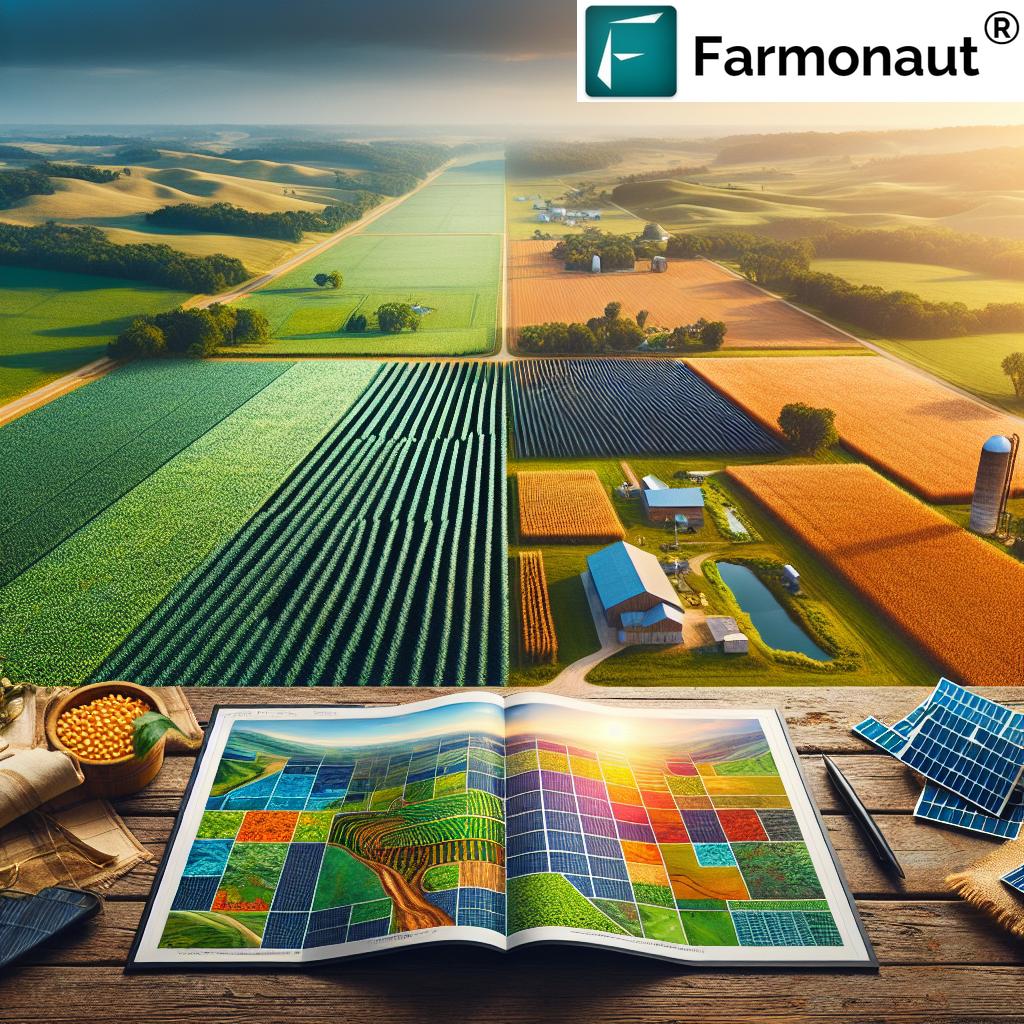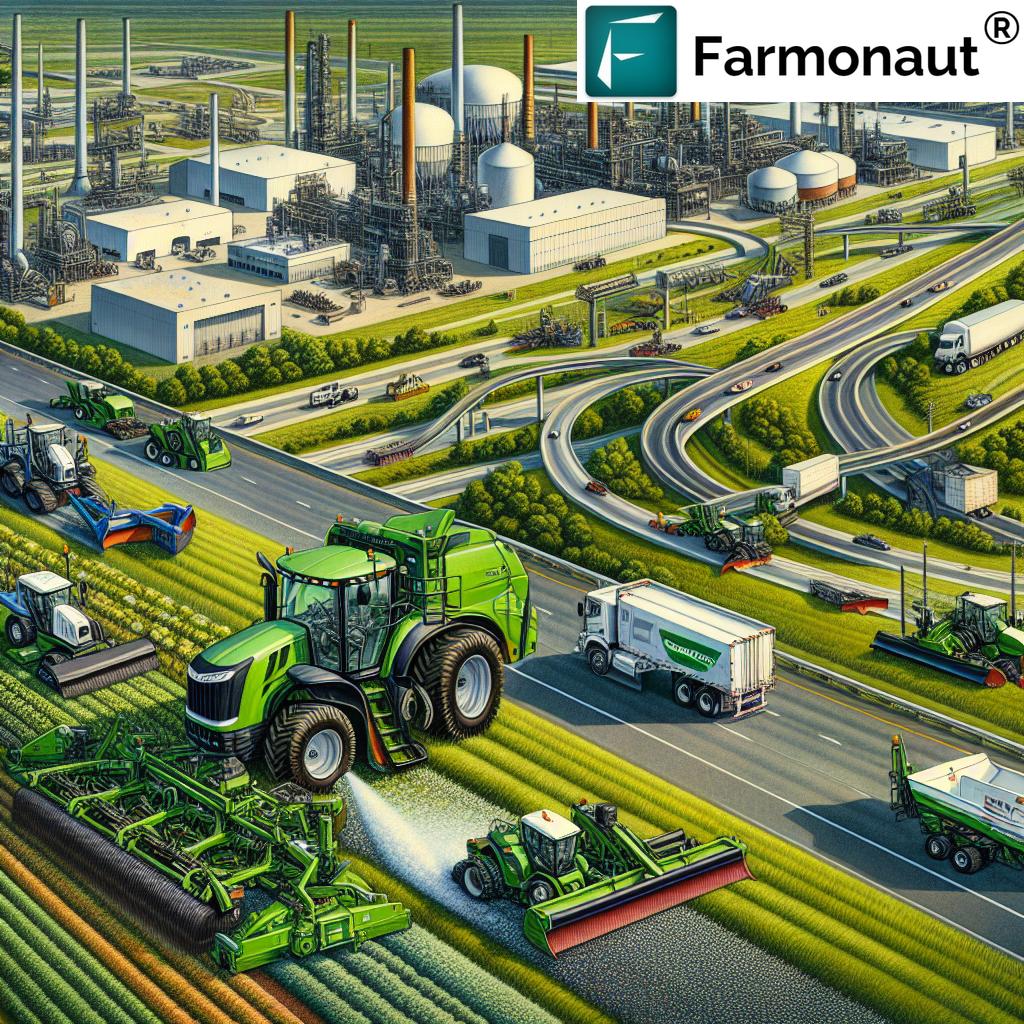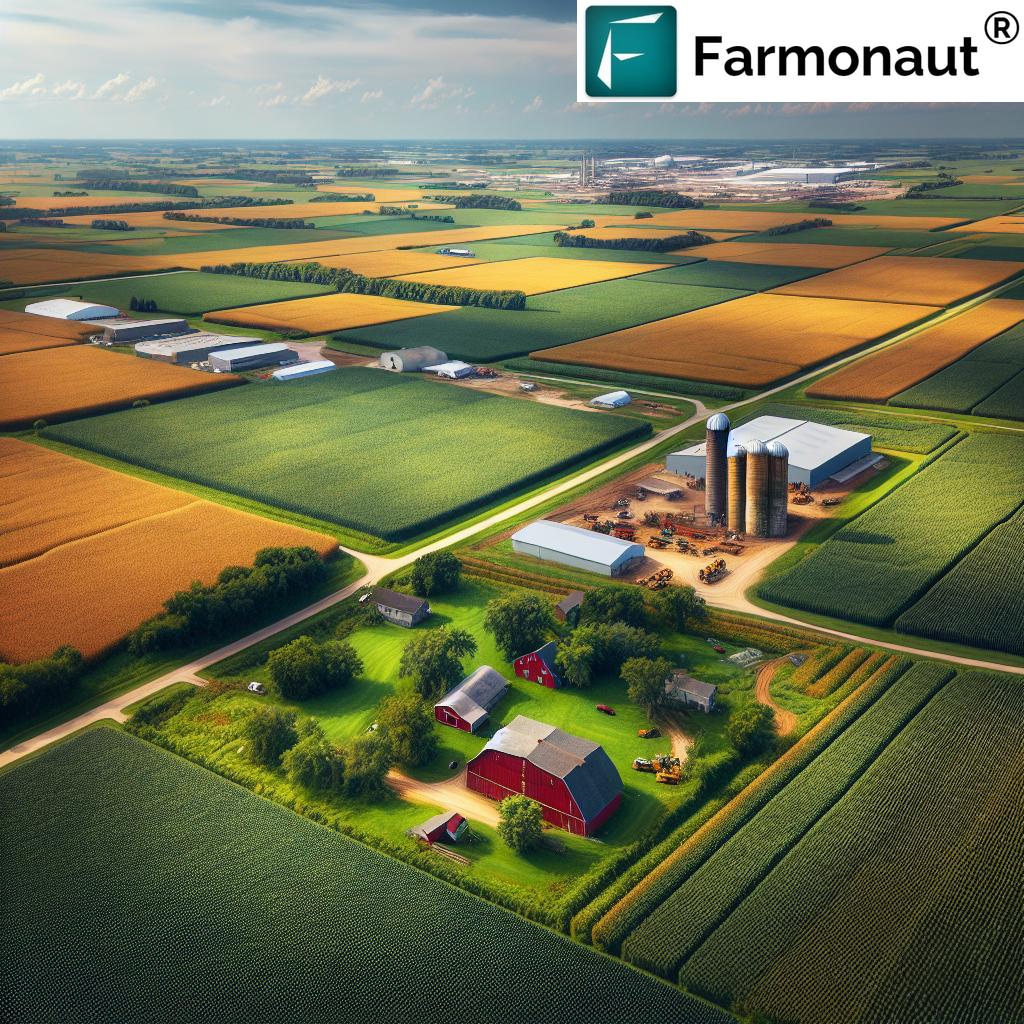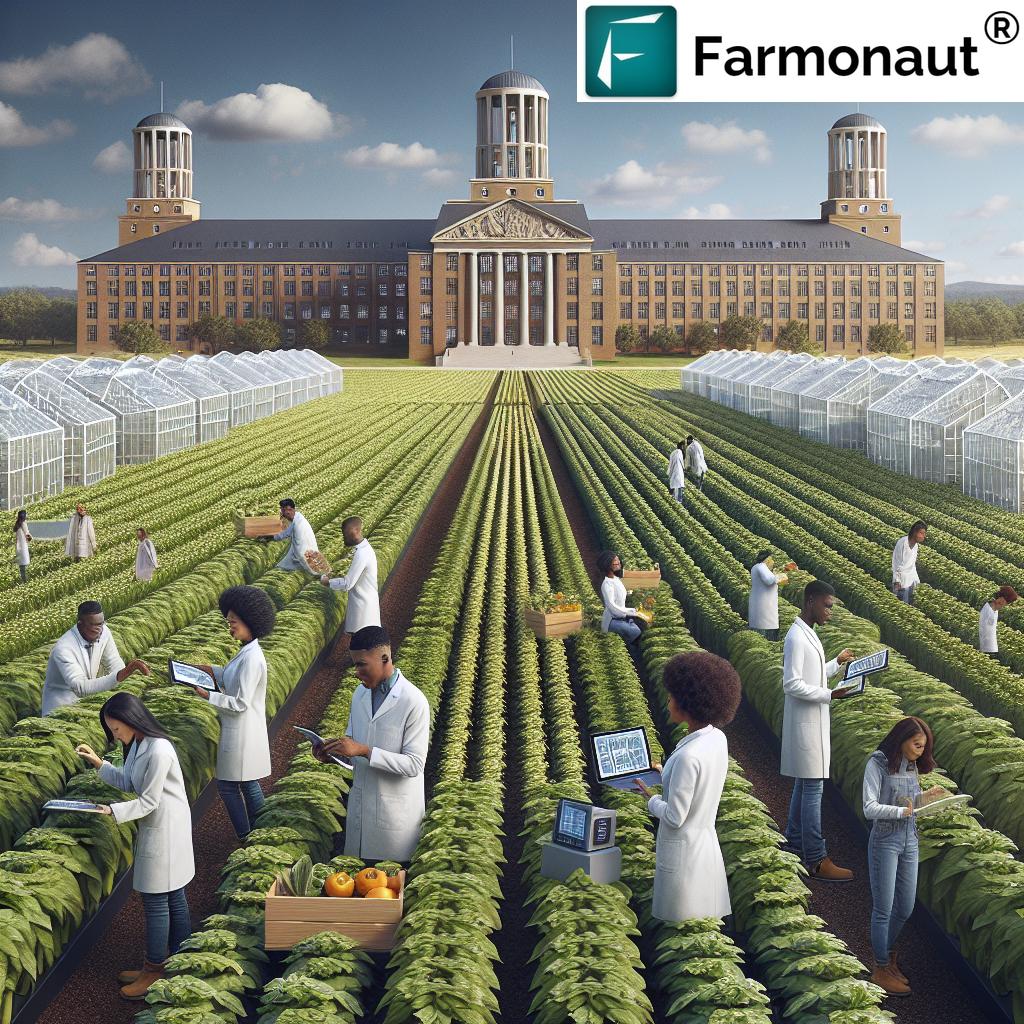Unlocking Soil Science: Farmonaut’s Guide to Precision Agriculture and Sustainable Farming in America
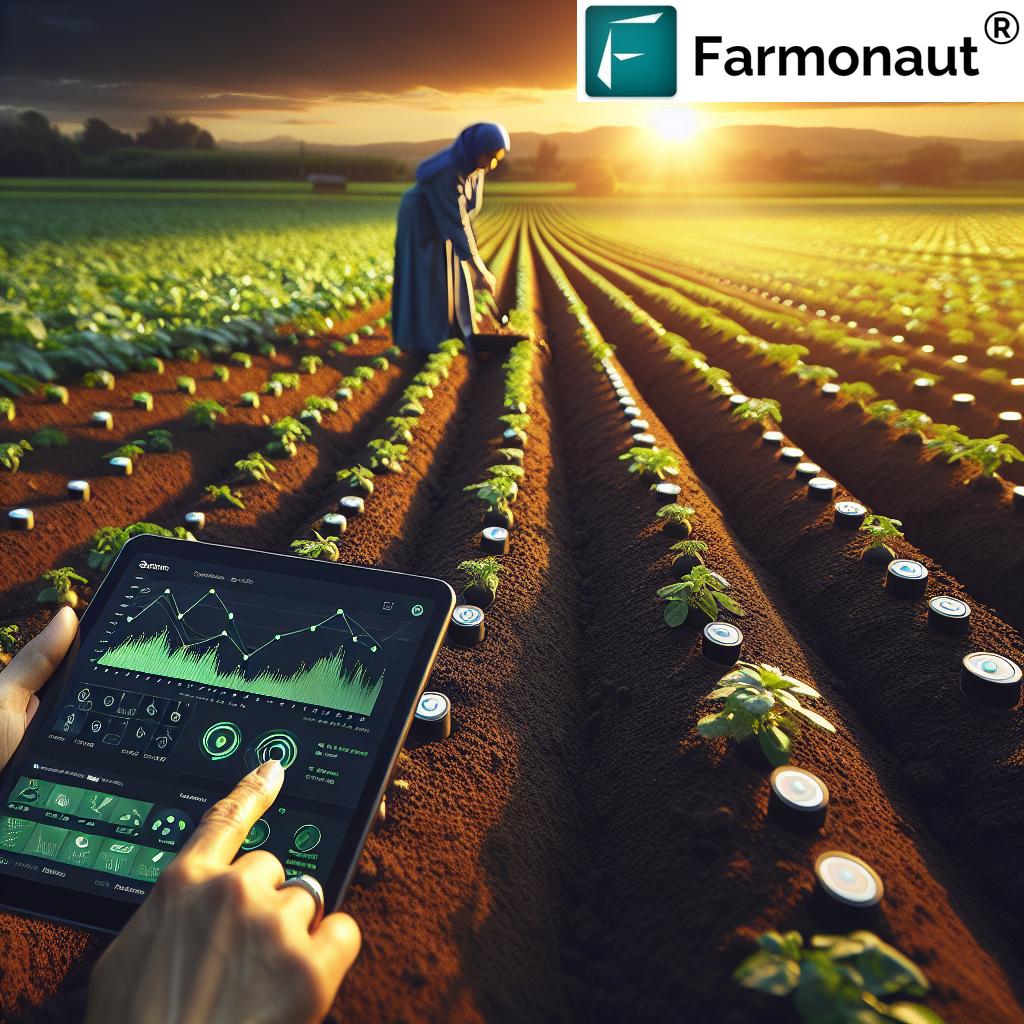
“Soil science certification programs have seen a 30% increase in enrollment over the past five years.”
In the ever-evolving landscape of American agriculture, soil science and sustainable farming practices have emerged as crucial pillars for the future of food production. As we navigate the challenges of climate change, resource scarcity, and increasing global food demand, the need for innovative solutions in agriculture has never been more pressing. At Farmonaut, we’re at the forefront of this agricultural revolution, harnessing the power of precision agriculture technology to empower farmers and revolutionize crop yield optimization.
In this comprehensive guide, we’ll delve deep into the world of soil science, exploring how cutting-edge agritech solutions are transforming traditional farming methods. From soil health management to advanced nutrient analysis, we’ll uncover the latest digital farming tools that are paving the way for environmentally responsible and economically viable agriculture in America.
The Foundation of Modern Agriculture: Understanding Soil Science
Soil science forms the bedrock of sustainable farming practices. It’s a multidisciplinary field that combines elements of biology, chemistry, and physics to understand the complex ecosystem beneath our feet. For farmers and agronomists in America, a solid grasp of soil science is essential for making informed decisions about crop management, resource allocation, and environmental stewardship.
- Soil Composition: Understanding the physical, chemical, and biological properties of soil
- Nutrient Cycling: How essential elements move through the soil-plant system
- Soil Health Indicators: Key metrics for assessing soil quality and productivity
- Soil Conservation: Strategies to prevent erosion and maintain soil structure
At Farmonaut, we recognize the critical role that soil science plays in modern agriculture. Our platform integrates advanced soil analysis techniques with satellite imagery to provide farmers with real-time insights into their soil’s health and composition. This data-driven approach allows for more precise management of soil resources, leading to improved crop yields and reduced environmental impact.
Precision Agriculture: The Cornerstone of Sustainable Farming
Precision agriculture represents a paradigm shift in farming practices, leveraging technology to optimize every aspect of crop production. By utilizing data from various sources, including satellite imagery, soil sensors, and weather stations, precision agriculture enables farmers to make highly targeted decisions about planting, irrigation, fertilization, and pest control.
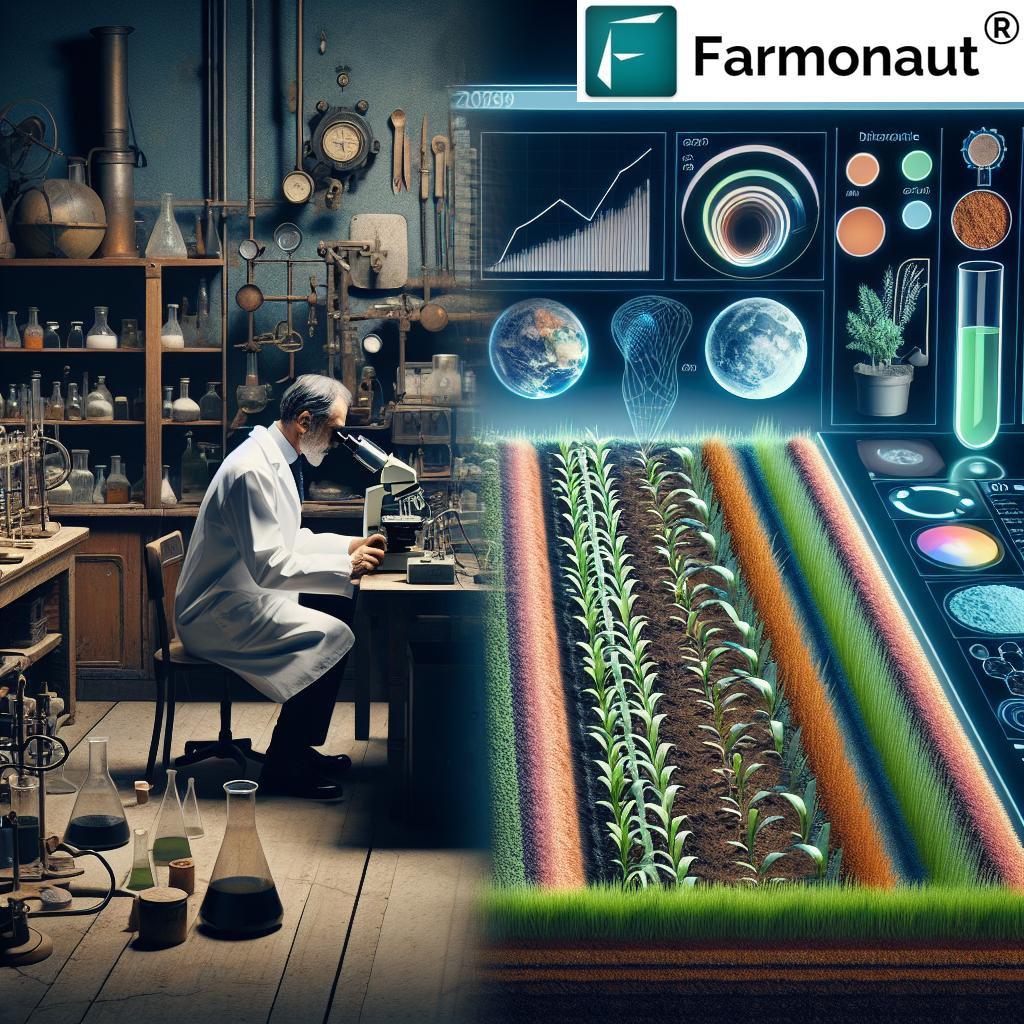
Key components of precision agriculture include:
- GPS-guided machinery: Ensuring precise application of inputs and reducing overlap
- Variable Rate Technology (VRT): Applying inputs at varying rates based on soil and crop needs
- Remote Sensing: Using satellite and drone imagery to monitor crop health and soil conditions
- Data Analytics: Processing large datasets to derive actionable insights for farm management
Farmonaut’s platform sits at the intersection of these technologies, providing farmers with a comprehensive suite of tools for precision agriculture. Our satellite-based crop health monitoring system, combined with AI-driven analytics, enables farmers to make data-informed decisions that optimize resource use and maximize yields.
The Role of Soil Health Management in Sustainable Farming
Soil health is a cornerstone of sustainable agriculture, directly impacting crop productivity, water retention, and carbon sequestration. As stewards of the land, farmers are increasingly recognizing the importance of maintaining and improving soil health for long-term agricultural sustainability.
“Precision agriculture techniques can reduce water usage in farming by up to 25% compared to traditional methods.”
Key aspects of soil health management include:
- Organic Matter Management: Increasing soil organic carbon through cover cropping and reduced tillage
- Soil Microbiology: Fostering beneficial microorganisms for nutrient cycling and plant health
- Soil Structure: Maintaining good soil aggregation for improved water infiltration and root growth
- Nutrient Balance: Ensuring optimal levels of macro and micronutrients for crop growth
Farmonaut’s soil health management tools provide farmers with detailed insights into their soil’s condition, enabling them to make informed decisions about soil amendments, crop rotations, and conservation practices. By integrating satellite imagery with on-ground data, we offer a comprehensive view of soil health across entire fields, helping farmers identify areas that need attention and track improvements over time.
Advanced Nutrient Analysis for Optimal Crop Growth
Efficient nutrient management is crucial for maximizing crop yields while minimizing environmental impact. Traditional methods of soil testing and nutrient analysis are being supplemented and, in some cases, replaced by more advanced technologies that offer greater precision and real-time data.
Farmonaut’s approach to nutrient analysis includes:
- Spectral Analysis: Using satellite imagery to assess crop nutrient status based on leaf reflectance
- AI-Driven Recommendations: Leveraging machine learning algorithms to provide tailored fertilizer recommendations
- Temporal Analysis: Tracking nutrient levels over time to identify trends and optimize application timing
- Integration with Weather Data: Considering environmental factors in nutrient uptake and availability
By providing farmers with detailed nutrient maps and AI-driven recommendations, Farmonaut enables precise application of fertilizers, reducing waste and minimizing the risk of nutrient runoff into water bodies. This not only improves crop yields but also contributes to better environmental stewardship.
Digital Farming Tools: Revolutionizing Agricultural Practices
The digital revolution has touched every aspect of modern life, and agriculture is no exception. Digital farming tools are transforming how farmers plan, execute, and monitor their operations, leading to increased efficiency and sustainability.
Some key digital farming tools include:
- Farm Management Software: Centralized platforms for planning, record-keeping, and decision-making
- IoT Sensors: Connected devices that provide real-time data on soil moisture, temperature, and other variables
- Automated Irrigation Systems: Smart systems that optimize water use based on crop needs and weather conditions
- Crop Modeling Software: Predictive tools that simulate crop growth under various scenarios
Farmonaut’s digital farming platform integrates these tools into a user-friendly interface, accessible via web and mobile applications. Our web app provides farmers with a comprehensive dashboard for monitoring crop health, managing resources, and accessing AI-driven insights.
The Impact of Climate Change on Agriculture and Adaptive Strategies
Climate change poses significant challenges to agriculture, affecting crop yields, water availability, and pest pressures. As temperatures rise and weather patterns become more erratic, farmers must adapt their practices to ensure food security and maintain profitability.
Key impacts of climate change on agriculture include:
- Shifting Growing Seasons: Changes in temperature and precipitation patterns affecting planting and harvest times
- Increased Water Stress: More frequent droughts and altered precipitation patterns impacting irrigation needs
- New Pest and Disease Pressures: Changing climates allowing pests and pathogens to expand their ranges
- Soil Degradation: Increased erosion and loss of soil organic matter due to extreme weather events
Farmonaut’s platform helps farmers navigate these challenges by providing:
- Climate-Smart Crop Recommendations: Suggesting varieties and management practices suited to changing conditions
- Early Warning Systems: Alerting farmers to potential climate-related risks based on weather forecasts and historical data
- Carbon Footprint Tracking: Helping farmers monitor and reduce their greenhouse gas emissions
- Adaptive Management Tools: Enabling quick adjustments to farm operations based on real-time climate data
Water Conservation Strategies in Modern Agriculture
Water scarcity is a growing concern in many agricultural regions of America. Implementing effective water conservation strategies is crucial for sustainable farming and ensuring long-term food security.
Innovative water conservation techniques include:
- Deficit Irrigation: Strategically reducing water application during less critical growth stages
- Precision Irrigation Systems: Using advanced technology to apply water only where and when it’s needed
- Soil Moisture Monitoring: Utilizing sensors to track soil water content and inform irrigation decisions
- Water-Efficient Crop Selection: Choosing crops and varieties that are well-adapted to local water availability
Farmonaut’s platform integrates water management tools that help farmers optimize their irrigation practices. By combining satellite-derived soil moisture data with local weather forecasts and crop water requirements, we provide farmers with precise irrigation recommendations that maximize water use efficiency.
Innovative Soil Testing Methods for Precision Agriculture
Accurate soil testing is fundamental to precision agriculture, providing the data needed for informed decision-making. While traditional lab-based soil testing remains important, new technologies are emerging that offer faster, more detailed, and in some cases, real-time soil analysis.
Cutting-edge soil testing methods include:
- In-Field Spectroscopy: Using handheld devices to analyze soil properties on-site
- Electrical Conductivity Mapping: Creating detailed soil texture maps to inform variable rate applications
- Remote Sensing: Utilizing satellite and drone imagery to assess soil properties over large areas
- IoT Soil Sensors: Deploying networked sensors for continuous monitoring of soil conditions
Farmonaut leverages these advanced soil testing methods, integrating them with our satellite-based monitoring system to provide farmers with a comprehensive view of their soil health. Our platform combines data from multiple sources to create detailed soil maps, enabling precise management of inputs and resources across fields.
The Future of Agronomy: Integrating Technology and Traditional Knowledge
As we look to the future of agriculture, it’s clear that success will depend on effectively integrating cutting-edge technology with traditional agronomic knowledge. This fusion of old and new is at the heart of Farmonaut’s approach to precision agriculture.
Key trends shaping the future of agronomy include:
- AI and Machine Learning: Developing more sophisticated predictive models for crop management
- Blockchain Technology: Enhancing traceability and transparency in agricultural supply chains
- Gene Editing: Creating crop varieties with enhanced resilience to climate change and pests
- Robotics and Automation: Reducing labor costs and improving precision in farm operations
Farmonaut is at the forefront of these technological advancements, continuously updating our platform to incorporate the latest innovations in agritech. Our commitment to research and development ensures that American farmers have access to the most advanced tools for sustainable and productive agriculture.
For developers interested in integrating our technology into their own applications, we offer a robust API with comprehensive documentation.
Soil Science Certification: Advancing Your Agricultural Career
For professionals looking to deepen their expertise in soil science and precision agriculture, obtaining a soil science certification can be a valuable career move. These certifications demonstrate a high level of knowledge and competence in the field, opening doors to advanced positions in research, consulting, and farm management.
Benefits of soil science certification include:
- Professional Recognition: Gaining credibility within the agricultural community
- Career Advancement: Qualifying for higher-level positions in agribusiness and research
- Continued Learning: Staying up-to-date with the latest developments in soil science
- Networking Opportunities: Connecting with other certified professionals in the field
While Farmonaut does not offer certification programs directly, our platform serves as an excellent resource for professionals preparing for certification exams. The real-world data and case studies available through our system provide valuable practical experience that complements theoretical knowledge.
Agricultural Research and Development: Driving Innovation in Farming
Continuous research and development are essential for addressing the evolving challenges in agriculture. From developing drought-resistant crop varieties to creating more efficient farming systems, R&D plays a crucial role in shaping the future of farming.
Key areas of agricultural R&D include:
- Crop Genetics: Developing varieties with enhanced yield, nutrition, and stress tolerance
- Sustainable Pest Management: Creating environmentally friendly methods for controlling pests and diseases
- Precision Agriculture Technologies: Advancing tools for data-driven farm management
- Soil Health Restoration: Developing techniques to improve degraded soils and increase carbon sequestration
Farmonaut is committed to supporting agricultural research through our data-sharing initiatives and collaborations with academic institutions. By providing researchers with access to our extensive database of agricultural data, we contribute to the advancement of scientific knowledge in the field.
Environmental Impact of Agriculture: Balancing Productivity and Sustainability
As the global population continues to grow, the agricultural sector faces the dual challenge of increasing food production while minimizing its environmental footprint. Sustainable farming practices are crucial for preserving soil health, protecting water resources, and mitigating climate change.
Key environmental concerns in agriculture include:
- Soil Erosion and Degradation: Loss of topsoil and declining soil fertility
- Water Pollution: Runoff of fertilizers and pesticides into water bodies
- Greenhouse Gas Emissions: Contribution to climate change through carbon dioxide and methane release
- Biodiversity Loss: Reduction in species diversity due to habitat destruction and pesticide use
Farmonaut’s precision agriculture tools address these environmental concerns by enabling farmers to:
- Optimize Input Use: Reducing excess application of fertilizers and pesticides
- Improve Water Management: Minimizing water waste and runoff
- Monitor Soil Health: Tracking key indicators of soil quality and implementing conservation practices
- Reduce Carbon Footprint: Implementing practices that sequester carbon and reduce emissions
By providing farmers with the tools to make data-driven decisions, Farmonaut helps balance agricultural productivity with environmental stewardship, ensuring a more sustainable future for American agriculture.
Comparison of Traditional vs. Precision Agriculture Practices
| Aspect | Traditional Agriculture | Precision Agriculture with Farmonaut |
|---|---|---|
| Soil Analysis Method | Annual soil testing | Real-time soil sensors and satellite imagery analysis |
| Water Management | Uniform irrigation across fields | Variable rate irrigation based on soil moisture maps |
| Nutrient Application | Blanket application of fertilizers | Targeted nutrient application based on crop needs and soil variability |
| Crop Yield Optimization | Based on historical yields and general recommendations | AI-driven recommendations considering multiple data points |
| Environmental Impact | Higher risk of over-application and runoff | Reduced input use and minimized environmental footprint |
Empowering Farmers with Digital Tools
In today’s digital age, farmers have access to a wide array of tools that can significantly enhance their decision-making processes and operational efficiency. Farmonaut is at the forefront of this digital revolution, offering a comprehensive suite of mobile and web applications designed specifically for the needs of modern farmers.
Our mobile applications for Android and iOS platforms bring the power of precision agriculture directly to farmers’ fingertips. These apps allow for on-the-go access to critical farm data, including:
- Real-time Crop Health Monitoring: Instantly view NDVI maps and vegetation health indices
- Weather Forecasts: Access localized weather predictions to plan farm activities
- Pest and Disease Alerts: Receive early warnings based on environmental conditions
- Task Management: Plan and track farm operations efficiently
By leveraging these digital tools, farmers can make informed decisions quickly, leading to improved crop management and increased profitability.
The Role of Education in Advancing Sustainable Agriculture
As the agricultural sector continues to evolve, education plays a crucial role in preparing the next generation of farmers and agronomists. Universities and colleges across America are updating their curricula to include courses on precision agriculture, soil science, and sustainable farming practices.
Key educational trends in agriculture include:
- Interdisciplinary Programs: Combining agriculture with computer science, data analytics, and environmental studies
- Hands-on Learning: Incorporating practical experience with advanced agricultural technologies
- Online Courses and Webinars: Providing flexible learning options for working professionals
- Industry Partnerships: Collaborating with agtech companies to expose students to cutting-edge tools
Farmonaut supports educational initiatives by offering resources and tools for students and educators. Our platform can be used in classroom settings to demonstrate real-world applications of precision agriculture concepts, bridging the gap between theory and practice.
The Future of Food: Sustainable Farming and Global Food Security
As we look towards the future, the importance of sustainable farming practices in ensuring global food security cannot be overstated. With the world population projected to reach 9.7 billion by 2050, the agricultural sector faces immense pressure to increase productivity while minimizing environmental impact.
Key challenges and opportunities in the future of food production include:
- Climate-Resilient Agriculture: Developing farming systems that can withstand extreme weather events
- Vertical Farming: Exploring urban agriculture solutions to reduce transportation costs and land use
- Alternative Proteins: Investing in plant-based and lab-grown meat alternatives
- Circular Agriculture: Implementing closed-loop systems that minimize waste and maximize resource efficiency
Farmonaut’s commitment to innovation positions us at the forefront of these emerging trends. Our platform continues to evolve, incorporating new technologies and methodologies that support the transition to a more sustainable and secure food system.
Conclusion: Embracing the Future of Agriculture with Farmonaut
As we’ve explored throughout this comprehensive guide, the future of agriculture lies in the intelligent integration of technology, sustainable practices, and traditional farming knowledge. Farmonaut stands at the forefront of this agricultural revolution, providing farmers with the tools and insights they need to navigate the challenges of modern farming.
From precision agriculture and soil health management to advanced nutrient analysis and water conservation, our platform offers a holistic approach to sustainable farming. By leveraging satellite technology, AI-driven analytics, and real-time data, we empower farmers to make informed decisions that optimize crop yields, reduce environmental impact, and ensure long-term profitability.
As we look to the future, Farmonaut remains committed to innovation and continuous improvement. We will continue to invest in research and development, forge partnerships with leading agricultural institutions, and adapt our platform to meet the evolving needs of farmers across America and beyond.
By embracing precision agriculture and sustainable farming practices, we can create a more resilient, productive, and environmentally responsible agricultural sector. Together, we can unlock the full potential of soil science and precision agriculture, ensuring a sustainable and food-secure future for generations to come.
FAQ Section
Q: What is precision agriculture, and how does Farmonaut support it?
A: Precision agriculture is an approach that uses technology to optimize crop management and resource use. Farmonaut supports precision agriculture by providing satellite-based crop monitoring, AI-driven insights, and data analytics tools that help farmers make informed decisions about planting, irrigation, fertilization, and pest control.
Q: How does Farmonaut’s technology contribute to soil health management?
A: Farmonaut’s platform integrates satellite imagery with on-ground data to provide comprehensive soil health assessments. This includes monitoring soil organic matter, nutrient levels, and moisture content, enabling farmers to implement targeted soil management practices and track improvements over time.
Q: Can Farmonaut’s tools help reduce the environmental impact of farming?
A: Yes, Farmonaut’s precision agriculture tools help reduce environmental impact by optimizing input use, improving water management, and enabling practices that promote soil health and carbon sequestration. This leads to reduced chemical runoff, water conservation, and lower greenhouse gas emissions.
Q: Is Farmonaut suitable for small-scale farmers or only large agricultural operations?
A: Farmonaut’s platform is designed to be scalable and accessible to farmers of all sizes. While it offers advanced features for large operations, the basic tools and insights can be valuable for small-scale farmers looking to improve their productivity and sustainability.
Q: How does Farmonaut integrate with other farm management tools and systems?
A: Farmonaut offers APIs that allow integration with other farm management software and tools. This enables seamless data exchange and incorporation of Farmonaut’s insights into existing farm management systems.









